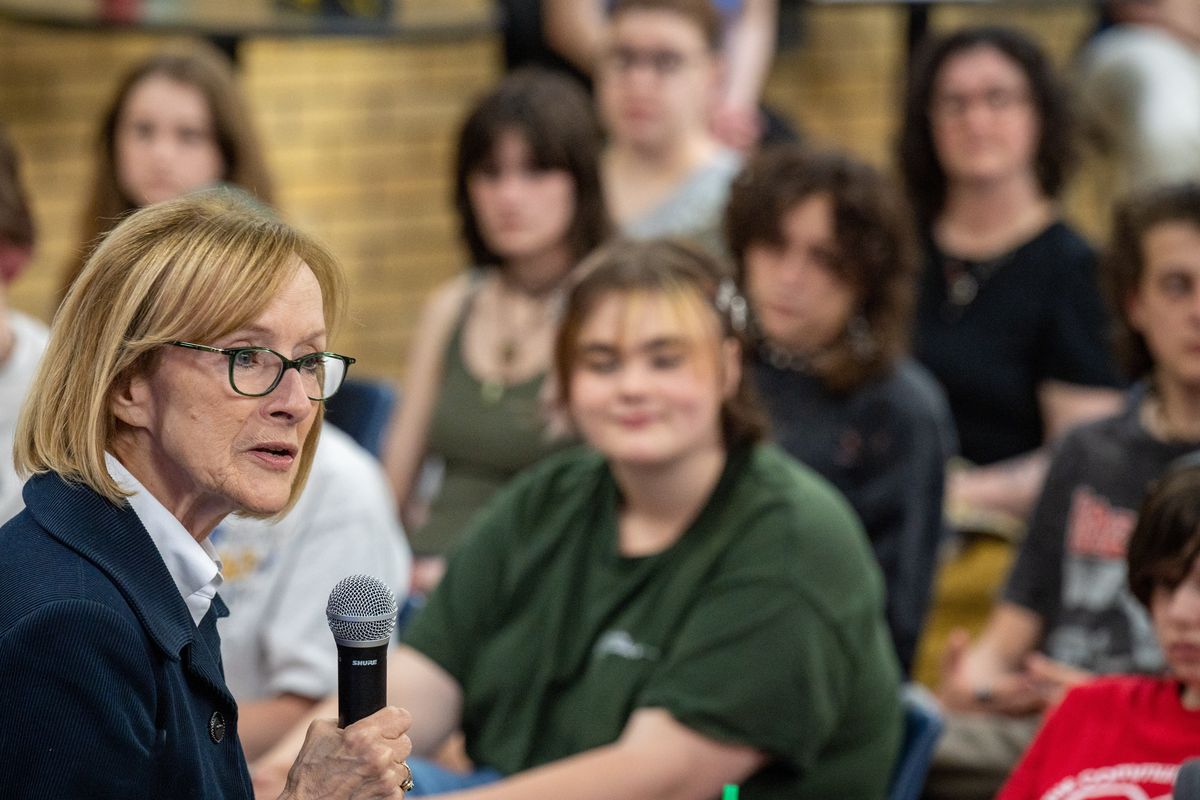‘I thrive on pressure’: Renowned journalist Judy Woodruff talks interviewing presidents, journalism in ‘crisis’

Longtime news broadcaster Judy Woodruff has interviewed the last nine U.S. presidents, but those haven’t been her coolest interviews.
“There aren’t many cool people in Washington (D.C.),” Woodruff said.
The 76-year-old answered questions Thursday afternoon from Shawn Vestal, a Spokesman-Review columnist, and from the Community School students about her five decades of experience covering politics and news at NBC, CNN and PBS. The talk was put on by KSPS PBS and the school.
Woodruff told the roughly 30 students in attendance at the West Central Spokane school that she looks fondly on her time covering former presidents Jimmy Carter and Ronald Reagan in the 1970s and ’80s because it was her introduction to covering national politics.
She said the two presidents were quite different: Carter, a Democrat, was a peanut farmer and Reagan, a Republican, was an actor in Hollywood.
Woodruff was covering Reagan the day he was shot in a 1981 assassination attempt. She said she heard the “pop, pop, pop” that everyone thought was the sound of fireworks but quickly realized were gunshots as U.S. Secret Service personnel were screaming for people to get down.
“It was just the worst kind of thing you’d ever have to cover or want to cover as a reporter,” she said.
However, Woodruff said she is nostalgic about that time when Republicans and Democrats differed politically but could be seen at dinner with each other.
“Today, that just doesn’t happen,” Woodruff said. “The two parties are very far apart.”
Woodruff, who stepped down as PBS NewsHour’s anchor in December, is working on a series, called “Judy Woodruff Presents: America at a Crossroads,” for the network that examines why the country is so politically divided.
“It’s so funny to me at this stage in my career I’m still finding really, really interesting things to cover because this country keeps changing in many ways, for the better but in many ways that are really troubling,” Woodruff said. “Your generation has a lot to figure out.”
Woodruff also addressed keys to being a good reporter and the state of media today.
She said reporters should listen and “prepare like crazy” for interviews with the expectation that some prepared questions will be thrown out. She said interviewing a president on camera is “very nerve-wracking,” but she enjoys the pressure that comes with it. She interviewed President Joe Biden in February.
“I thrive on pressure,” Woodruff said.
She said it’s becoming more difficult to discern what is true and false in media, and that readers and listeners need to use common sense and look at the source of information to determine its validity.
Woodruff recalled what her first producer said to her as a young reporter: “No one cares what you think.”
“It was drilled into me that I was to keep my views out,” she said.
Woodruff said it’s important to the nation’s democracy that reporters provide the news “straight” and let their audience make up their mind on the topic.
“I feel very strongly if we don’t continue to have straight reporting in this country, it weakens our democracy,” she said.

The students in attendance Thursday are working on a project called, “Lights, Camera, Take Action,” a KQED Learn “Call for Change” challenge that allows students across the country to make videos or audio recordings on topics they’re passionate about, said David Egly, social studies project facilitator at the Community School.
Some students told Woodruff about their projects, which included gun control, sex trafficking and sex education in schools, and asked Woodruff for advice on their assignments.
Woodruff told the students to gain a deep understanding for their topics and present them in an understandable and compelling way so people care about them.
Woodruff spoke to students and posed for a group picture with them after her talk.
She told The Spokesman-Review she wants students to know journalism matters, especially now because of the sea of misinformation. Woodruff said if students are curious and willing to work unpredictable hours, they should pursue the career.
“I think right now that journalism is in a kind of crisis because so much of local journalism has shrunk,” she said. “Some places disappeared.”